life_beyond_earth
其它星球有生命吗英语作文

其它星球有生命吗英语作文下载温馨提示:该文档是我店铺精心编制而成,希望大家下载以后,能够帮助大家解决实际的问题。
文档下载后可定制随意修改,请根据实际需要进行相应的调整和使用,谢谢!并且,本店铺为大家提供各种各样类型的实用资料,如教育随笔、日记赏析、句子摘抄、古诗大全、经典美文、话题作文、工作总结、词语解析、文案摘录、其他资料等等,如想了解不同资料格式和写法,敬请关注!Download tips: This document is carefully compiled by theeditor. I hope that after you download them,they can help yousolve practical problems. The document can be customized andmodified after downloading,please adjust and use it according toactual needs, thank you!In addition, our shop provides you with various types ofpractical materials,such as educational essays, diaryappreciation,sentence excerpts,ancient poems,classicarticles,topic composition,work summary,word parsing,copy excerpts,other materials and so on,want to know different data formats andwriting methods,please pay attention!英文回答:Is there life beyond Earth? It's a question that has fascinated humans for centuries, and one that we may never know the answer to for sure. But there are some tantalizing clues that suggest that we may not be alone in the universe.One of the most important factors in determining whether a planet can support life is its distance from its star. A planet that is too close to its star will be too hot for liquid water to exist on its surface, while a planet that is too far away will be too cold. Earth is located in the "habitable zone" of our solar system, which means that it is just the right distance from the sun to support liquid water.Another important factor is the presence of a thick atmosphere. An atmosphere helps to regulate a planet's temperature and protect it from harmful radiation. Earth's atmosphere is made up of a mixture of gases, including nitrogen, oxygen, and carbon dioxide. These gases help to keep Earth's surface temperature relatively stable and protect us from the sun's harmful rays.Of course, the most important factor in determining whether a planet can support life is the presence of water. Water is essential for all known forms of life, and it is thought that any planet that has liquid water on its surface is likely to be habitable.So, what are the chances that there is life on other planets? It's impossible to say for sure, but there are some reasons to be optimistic. First, there are billions of stars in our galaxy, and many of them are likely to have planets orbiting them. Second, we know that there are many different types of planets, and some of them are likely to be habitable. Third, we have discovered that life on Earth is incredibly resilient. It can survive in a wide range of environments, from the depths of the ocean to the tops of mountains.Of course, there are also some reasons to be pessimistic. First, we have yet to find any definitive evidence of life beyond Earth. Second, the universe is a vast and dangerous place, and it is possible that life is very rare. Third, even if there is life on other planets, it is likely to be very different from life on Earth.Ultimately, the question of whether there is life beyond Earth is one that we may never know the answer to. But it is a question that is worth asking, and one that will continue to fascinate us for centuries to come.中文回答:地球之外还有生命吗?这个问题已经让人类着迷了几个世纪,而且我们可能永远无法确定答案。
最近研究发现的地球外生命的证据

最近研究发现的地球外生命的证据1. 引言1.1 背景介绍地球外生命一直是人类探索宇宙的核心问题之一。
几个世纪以来,人们一直在问自身是否是宇宙中唯一的智慧生命存在。
然而,随着科技的进步和研究技术的提高,越来越多的证据暗示着地球外生命的存在。
最近的研究更加支持这一观点,为我们揭示了关于宇宙生命之谜的新见解。
1.2 研究意义识别和了解地球外生命对我们理解宇宙起源、自然进化以及生命本质有着重要意义。
更深入地探索这个领域可以为我们提供跨学科研究和协作机会,并推动科学、技术和哲学等领域的突破性发展。
此外,地球外生命探索还可以为人类未来提供新方向和可能性,从而影响到众多领域如太空旅行、资源开发以及文化互动等。
1.3 研究目的本文将概述最近研究所发现的与地球外生命相关的证据,并探讨这些发现对未来地外生命探索工作的启示与展望。
通过全面介绍相关研究成果和对未来研究的建议,我们希望为地球外生命探索领域的科学家、政策制定者和公众提供一份有价值的参考,促进更广泛的讨论和合作。
同时,我们也希望引起人们对这个令人着迷话题的关注,并激发更多人的兴趣和参与。
最终,我们希望通过这项工作推进科学界对地球外生命存在可能性的理解,并为人类揭示宇宙中更大的奥秘。
注意:本文所强调及涉及的所有观点属于研究证据阶段,需要进一步验证和研究以形成确定性结论。
2. 地球外生命的可能性2.1 地外生命存在的理论依据The possibility of extraterrestrial life existing is based on several theoretical foundations. One such foundation is the concept of panspermia, which suggests that life on Earth may have originated from microorganisms or organic molecules brought to our planet through meteorite impacts or interstellar dust. This theory proposes that if life could survive the harsh conditions of space travel, it is likely that similar forms of life could exist in other parts of the universe.Another theoretical basis for the existence of extraterrestrial life is the sheer vastness of the universe. The universe is estimated to contain billions of galaxies, each with billions of stars, and many planets capable of supporting life as we know it. With such an immense number of potential habitats, it seems plausible that at least some of them mayharbor alien organisms.Additionally, studies have shown that extremophiles –organisms capable of surviving in extreme environments on Earth –can thrive in conditions previously thought to be inhospitable for life. These extremophiles include bacteria living in deep-sea hydrothermal vents, in highly acidic environments, and even within rocks miles beneath the Earth's surface. Such findings suggest that if similar extreme conditions exist elsewhere in the universe, they may also support microbial life.2.2 太空中可能存在生命的环境条件In recent years, scientists have discovered a wide range of environments in space that could potentially support life. One example is Europa, one of Jupiter's moons, which has a subsurface ocean beneath its icy crust. This ocean may contain all the necessary ingredients for life: liquid water, organic compounds, and a source of energy from volcanic activity or tidal forces generated by Jupiter's gravitational pull.Another intriguing location is Saturn's moon Enceladus, which has geysers spewing water vapor and organic molecules from its subsurface ocean into space. These plumes indicate the presence of hydrothermal vents similar to those found on Earth, providing potential habitats formicrobial life.Furthermore, exoplanets, which are planets orbiting stars outside our solar system, have also been identified as potential candidates for hosting life. Some exoplanets fall within the habitable zone of their star –the region where temperatures allow liquid water to exist on their surface. These exoplanets may possess atmospheres and environmental conditions conducive to supporting life forms similar to those found on Earth.2.3 具有潜在地外生命体迹象的行星及卫星Several celestial bodies in our solar system exhibit signs that raise the possibility of extraterrestrial life. One significant example is Mars, often referred to as the "Red Planet." Mars possesses a thin atmosphere and evidence suggests that liquid water once flowed on its surface. Recent discoveries of methane plumes and seasonal changes in atmospheric composition have sparked interest in the possibility of microbial life existing or having existed on Mars.Titan, Saturn's largest moon, is another intriguing target for astrobiology research. It has a dense atmosphere composed primarily of nitrogen, with traces of methane and other organic compounds. Lakes of liquidmethane and ethane have been observed on its surface, potentially offering an entirely different type of environment capable of supporting unique forms of life.These discoveries and observations highlight the potential existence of extraterrestrial life beyond Earth. Continued exploration and scientific investigation both within our solar system and beyond will be crucial in shedding further light on this exciting frontier of discovery.3. 最近研究发现与证据3.1 外星微生物化石发现研究成果最近的研究表明,在地球以外的行星和卫星上发现了一些可能是外星微生物化石的证据。
地球之外的作文英语版高中
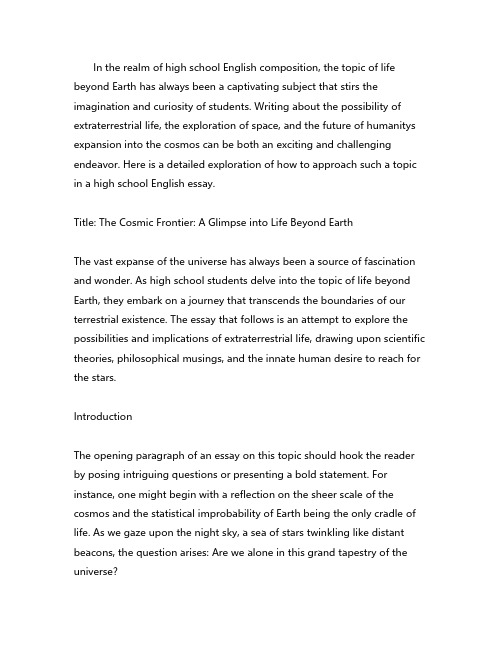
In the realm of high school English composition,the topic of life beyond Earth has always been a captivating subject that stirs the imagination and curiosity of students.Writing about the possibility of extraterrestrial life,the exploration of space,and the future of humanitys expansion into the cosmos can be both an exciting and challenging endeavor.Here is a detailed exploration of how to approach such a topic in a high school English essay.Title:The Cosmic Frontier:A Glimpse into Life Beyond EarthThe vast expanse of the universe has always been a source of fascination and wonder.As high school students delve into the topic of life beyond Earth,they embark on a journey that transcends the boundaries of our terrestrial existence.The essay that follows is an attempt to explore the possibilities and implications of extraterrestrial life,drawing upon scientific theories,philosophical musings,and the innate human desire to reach for the stars.IntroductionThe opening paragraph of an essay on this topic should hook the reader by posing intriguing questions or presenting a bold statement.For instance,one might begin with a reflection on the sheer scale of the cosmos and the statistical improbability of Earth being the only cradle of life.As we gaze upon the night sky,a sea of stars twinkling like distant beacons,the question arises:Are we alone in this grand tapestry of the universe?Body ParagraphsThe body of the essay can be structured around several key areas:1.The Search for Extraterrestrial Life:Discuss the ongoing scientific efforts to detect life beyond Earth,such as the search for exoplanets in the habitable zones of their stars and the study of extremophiles on Earth to understand where life might thrive.2.The Possibility of Life Forms:Explore the various forms life might take, from microbial organisms to complex ecosystems,and consider the factors that could influence the development of life on other planets.3.The Technological Advancements:Reflect on the technological progress that has enabled space exploration and the potential future developments that could facilitate human colonization of other planets or moons.4.The Ethical and Philosophical Implications:Consider the ethical dilemmas of space exploration,such as the potential impact on any discovered life forms,and the philosophical implications of humanitys place in the universe.5.The Future of Human Civilization:Speculate on the future of humanity in the context of space exploration,including the potential for interstellar travel and the establishment of extraterrestrial settlements.Each paragraph should be rich in detail,providing examples,scientific data, and expert opinions to support the arguments.For example,when discussing the search for extraterrestrial life,one might cite the discovery of water on Mars or the detection of potentially habitable exoplanets by the Kepler Space Telescope.ConclusionThe conclusion should synthesize the main points discussed in the body and offer a thoughtful reflection on the broader implications of the topic. It might end with a call to action,encouraging further exploration and a continued pursuit of knowledge.As we stand on the precipice of a new era of discovery,the quest for life beyond Earth is not just a scientific endeavor but a journey that defines our very essence as an inquisitive and ambitious species.Writing Style and TechniquesTo make the essay engaging and accessible,employ a conversational tone that invites the reader to ponder the mysteries of the cosmos alongside the e vivid descriptions to paint a picture of the universe and the potential it holds.Sensory details,such as the aweinspiring sight of a meteor shower or the silence of space,can enhance the readers experience.Citations and ReferencesEnsure that all scientific claims and data are properly cited,providing abibliography of reputable sources.This not only lends credibility to the essay but also encourages readers to explore the topic further.Final ThoughtsWriting an essay on life beyond Earth is an opportunity for high school students to stretch their imaginations and engage with some of the most profound questions humanity has ever asked.By combining rigorous research with creative expression,students can craft a compelling narrative that captures the essence of our cosmic curiosity and the boundless potential of the universe.。
生活在地球上的人 英语
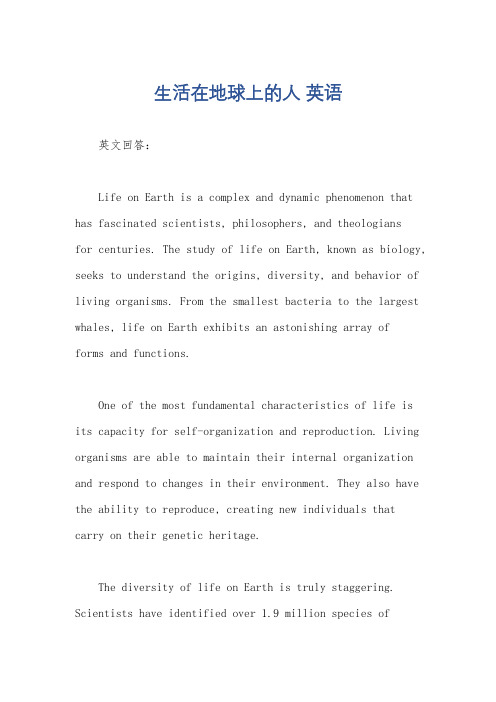
生活在地球上的人英语英文回答:Life on Earth is a complex and dynamic phenomenon that has fascinated scientists, philosophers, and theologiansfor centuries. The study of life on Earth, known as biology, seeks to understand the origins, diversity, and behavior of living organisms. From the smallest bacteria to the largest whales, life on Earth exhibits an astonishing array offorms and functions.One of the most fundamental characteristics of life is its capacity for self-organization and reproduction. Living organisms are able to maintain their internal organization and respond to changes in their environment. They also have the ability to reproduce, creating new individuals thatcarry on their genetic heritage.The diversity of life on Earth is truly staggering. Scientists have identified over 1.9 million species ofanimals, plants, fungi, and microorganisms, and it is estimated that there may be as many as 10 million species yet to be discovered. This diversity is a result ofbillions of years of evolution, during which organisms have adapted to a wide range of habitats and ecological niches.The behavior of living organisms is another fascinating aspect of life on Earth. Animals exhibit a wide range of behaviors, from simple reflexes to complex social interactions. Plants also exhibit a variety of behaviors, such as photosynthesis, growth, and reproduction. These behaviors are essential for the survival and success of living organisms.Life on Earth is not static, but rather is constantly evolving. Over time, natural selection and other evolutionary forces shape the traits of organisms, leading to the emergence of new species and the extinction of others. This process of evolution has resulted in the incredible diversity of life that we see today.The study of life on Earth has profound implicationsfor our understanding of ourselves and our place in the universe. By studying the origins and evolution of life, we can gain insights into the nature of consciousness, the meaning of existence, and the possibility of life beyond Earth.中文回答:地球上生命是一个复杂而充满活力的现象,它已经让科学家、哲学家和神学家着迷了几个世纪。
英语作文该不该去外太空寻找生命呢
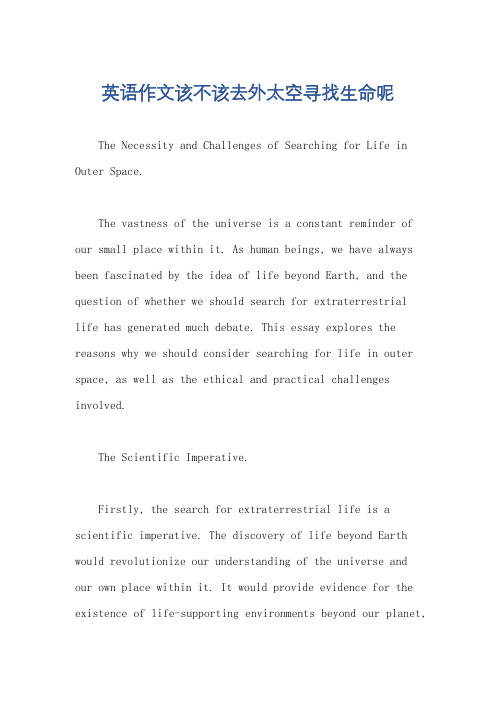
英语作文该不该去外太空寻找生命呢The Necessity and Challenges of Searching for Life in Outer Space.The vastness of the universe is a constant reminder of our small place within it. As human beings, we have always been fascinated by the idea of life beyond Earth, and the question of whether we should search for extraterrestriallife has generated much debate. This essay explores the reasons why we should consider searching for life in outer space, as well as the ethical and practical challenges involved.The Scientific Imperative.Firstly, the search for extraterrestrial life is a scientific imperative. The discovery of life beyond Earth would revolutionize our understanding of the universe and our own place within it. It would provide evidence for the existence of life-supporting environments beyond our planet,potentially answering fundamental questions about theorigin and prevalence of life in the universe. Such discoveries would also inform our understanding of the evolution of life and the possibility of commonevolutionary ancestors between Earth and extraterrestriallife forms.The Potential for Scientific Breakthroughs.Moreover, the search for extraterrestrial life could lead to significant scientific breakthroughs. The development of advanced technologies to detect and studylife in outer space would require significant investment in research and innovation. This could lead to spin-off technologies that benefit humanity in areas such as medicine, materials science, and even communication technologies. The quest for extraterrestrial life couldalso inspire a new generation of scientists and researchers, igniting a renewed sense of curiosity and exploration.Ethical Considerations.However, the search for extraterrestrial life also raises ethical considerations. One such consideration is the potential impact on indigenous extraterrestrial life forms. If we were to discover life in outer space, it is crucial that we approach it with respect and caution. We must ensure that our actions do not harm or disrupt these potentially fragile ecosystems. Additionally, the discovery of extraterrestrial life could raise complex ethical questions about the rights and status of these life forms. How should we treat them? Should we consider them part of our moral community? These are questions that we must grapple with as we embark on this journey.Practical Challenges.Practically, the search for extraterrestrial life presents significant challenges. One of the mostsignificant obstacles is the vastness of the universe. Even with advanced telescopes and spacecraft, it is an immense task to scan the billions of stars and planets in search of life-supporting environments. Furthermore, the cost of such an endeavor is staggering, requiring significant investmentin funding and resources.Moreover, even if we were to detect signs of life in outer space, verifying its existence would be an even greater challenge. We would need to develop even more advanced technologies to collect samples and analyze them for evidence of life. This process could take years or even decades, requiring耐心 and persistence.Conclusion.In conclusion, the search for extraterrestrial life is a complex and multifaceted issue that raises a range of ethical, practical, and scientific considerations. While the challenges are significant, the potential rewards are immense. The discovery of life beyond Earth could revolutionize our understanding of the universe and inspire a new era of scientific exploration. As we embark on this journey, it is crucial that we approach it with respect, caution, and a sense of awe for the wonders that lie beyond our planet.。
life beyond earth 词汇

yieldБайду номын сангаас
• 生出,出产;产生:the apple tree yields plenty of apples. • ~capacity 生产能力 • 交出,投降:not yield a step. They yield the fortress to the enemy.
Life beyond earth
plausible
• Such talk, however plausible, is actually specious and groundless. 这些话,讲起来好像有道理,实际上是毫 无根据、似是而非的空谈。 • He cast about in his mind for some plausible excuse for not turning up at the meeting. 他心里在算盘,想找一个什么说得过去的 理由来解释他为什么没有到会。
关于火星生活优点的英语作文
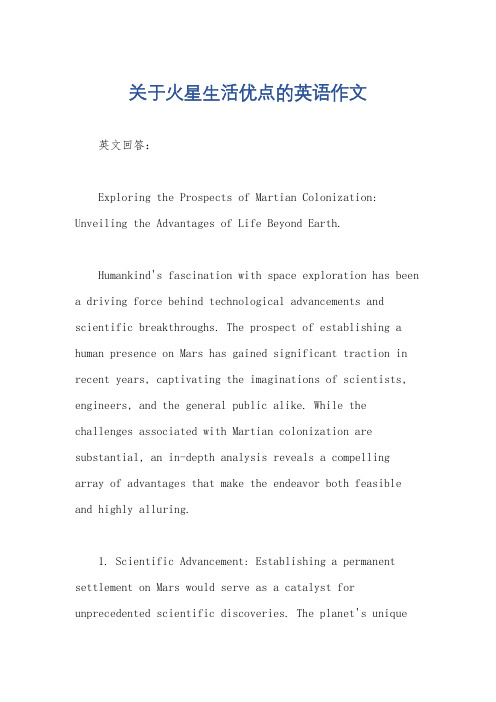
关于火星生活优点的英语作文英文回答:Exploring the Prospects of Martian Colonization: Unveiling the Advantages of Life Beyond Earth.Humankind's fascination with space exploration has been a driving force behind technological advancements and scientific breakthroughs. The prospect of establishing a human presence on Mars has gained significant traction in recent years, captivating the imaginations of scientists, engineers, and the general public alike. While the challenges associated with Martian colonization are substantial, an in-depth analysis reveals a compelling array of advantages that make the endeavor both feasible and highly alluring.1. Scientific Advancement: Establishing a permanent settlement on Mars would serve as a catalyst for unprecedented scientific discoveries. The planet's uniqueenvironment, pristine landscape, and intriguing past hold the potential to unravel mysteries about its geological evolution, potential for life, and the broader history of our solar system. By conducting scientific research in situ, scientists would have access to a wealth of data and samples, enabling them to expand our understanding of astrobiology, geology, and atmospheric processes beyond anything currently achievable through remote observation.2. Resource Utilization: Mars is rich in untapped resources that could sustain a Martian colony. Its atmosphere, while thin, contains carbon dioxide that can be converted into oxygen and methane through advanced technologies. Additionally, the planet's surface holds abundant water ice, which could be extracted and processed for human consumption and other industrial applications.The potential for utilizing Martian resources, such as minerals and metals, could reduce the dependency on Earth-based supplies, ensuring the long-term sustainability of a Martian settlement.3. Economic Expansion: Space exploration and thedevelopment of Martian colonies could create new frontiers for economic growth. The extraction and processing of Martian resources, the development of specialized technologies, and the establishment of scientific research facilities would drive innovation and create high-value industries on both Earth and Mars. The commercialization of space through tourism, mining operations, and the development of new materials could lead to economic diversification and the creation of new markets.4. Human Resilience: Establishing a human presence on Mars would demonstrate the extraordinary adaptability and resilience of humankind. The challenges of living in an extraterrestrial environment would demand innovative solutions, pushing the boundaries of human ingenuity. By overcoming these challenges, humanity would acquire invaluable knowledge and technologies that could be applied to other aspects of life on Earth, such as extreme environments, disaster preparedness, and energy efficiency.5. Global Cooperation: The endeavor of colonizing Mars is a global undertaking that would require thecollaboration of scientists, engineers, and governments from around the world. This shared endeavor has the potential to foster international cooperation, promote peaceful scientific competition, and unite humanity in the pursuit of a common goal. By working together, nations can pool their resources, share knowledge, and achieve something truly extraordinary.6. Inspiration for Future Generations: A successful Martian colony would be a testament to human curiosity, determination, and the power of scientific exploration. It would inspire generations to come, stimulating interest in STEM fields, fostering a sense of wonder and boundless possibilities. The achievements made in the realm of space exploration can ignite passion, spark innovation, and shape the future of humanity in unfathomable ways.中文回答:殖民火星的优势有哪些?随着科学技术的进步和探索的深入,人类对太空充满了好奇心和向往。
太空真奇妙三百字英语作文

太空真奇妙三百字英语作文Title: Space: A Marvelous Journey。
1. (Unleash Imagination)。
In the vast expanse of the cosmos, space, our cosmic playground, is a realm of boundless wonder. It's not just a distant, cold void, but a symphony of stars, galaxies, and mysteries waiting to be discovered.2. (Uncharted Territory)。
Imagine stepping into a universe where time and space blur, where the Earth is but a speck in the grand scheme. The constellations, like celestial tapestries, tell tales of ancient stories, their light echoing through the ages.3. (Life Beyond Earth)。
The search for extraterrestrial life, a cosmic puzzle,piques our curiosity. Our planet, Earth, is but one chapter in the grand book of existence. Could there be other worlds teeming with life, their own unique ecosystems?4. (Space Exploration)。
Space missions, like the Apollo missions, remind us of human ingenuity. They not only expand our knowledge but also inspire us to dream of the infinite possibilities that lie beyond our planet.5. (Space as a Teacher)。
假如科学家发现火星有生命英语作文
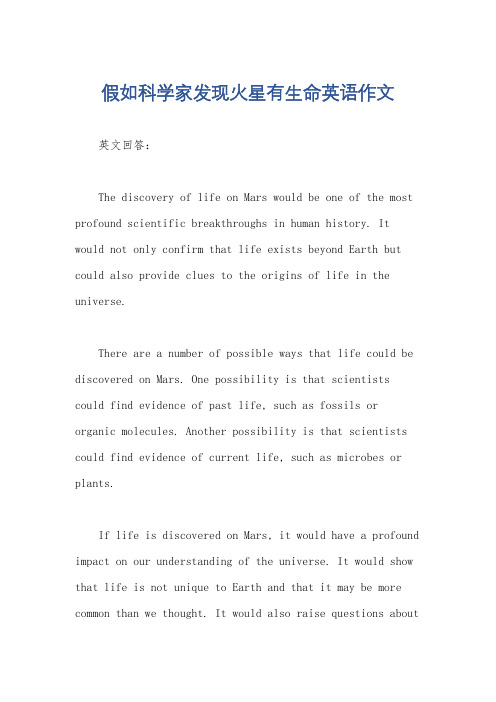
假如科学家发现火星有生命英语作文英文回答:The discovery of life on Mars would be one of the most profound scientific breakthroughs in human history. It would not only confirm that life exists beyond Earth but could also provide clues to the origins of life in the universe.There are a number of possible ways that life could be discovered on Mars. One possibility is that scientists could find evidence of past life, such as fossils or organic molecules. Another possibility is that scientists could find evidence of current life, such as microbes or plants.If life is discovered on Mars, it would have a profound impact on our understanding of the universe. It would show that life is not unique to Earth and that it may be more common than we thought. It would also raise questions aboutthe origins of life and the possibility of life elsewhere in the universe.中文回答:如果科学家发现火星上有生命,这将是人类历史上最深刻的科学突破之一。
寻找地球以外的生命有什么意义英语作文
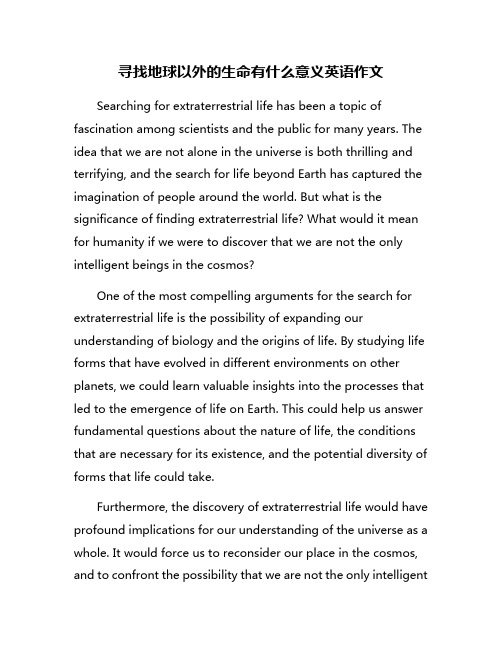
寻找地球以外的生命有什么意义英语作文Searching for extraterrestrial life has been a topic of fascination among scientists and the public for many years. The idea that we are not alone in the universe is both thrilling and terrifying, and the search for life beyond Earth has captured the imagination of people around the world. But what is the significance of finding extraterrestrial life? What would it mean for humanity if we were to discover that we are not the only intelligent beings in the cosmos?One of the most compelling arguments for the search for extraterrestrial life is the possibility of expanding our understanding of biology and the origins of life. By studying life forms that have evolved in different environments on other planets, we could learn valuable insights into the processes that led to the emergence of life on Earth. This could help us answer fundamental questions about the nature of life, the conditions that are necessary for its existence, and the potential diversity of forms that life could take.Furthermore, the discovery of extraterrestrial life would have profound implications for our understanding of the universe as a whole. It would force us to reconsider our place in the cosmos, and to confront the possibility that we are not the only intelligentbeings in existence. This could have significant philosophical, religious, and cultural implications, and could lead to a reevaluation of our societal values and priorities.Moreover, the search for extraterrestrial life could have practical benefits for humanity. For example, the technologies developed in the search for extraterrestrial life could have applications in other areas, such as medicine, agriculture, and environmental science. Additionally, the discovery of extraterrestrial life could inspire new generations of scientists and engineers to pursue careers in STEM fields, leading to advances in technology and innovation.In conclusion, the search for extraterrestrial life has the potential to have a profound impact on our understanding of the universe and our place in it. It could expand our knowledge of biology, challenge our philosophical and cultural beliefs, and inspire technological innovation. While the discovery of extraterrestrial life is by no means guaranteed, the quest to find it is a noble and worthwhile endeavor that has the potential to shape the future of humanity.。
寻找地球以外生命的意义英语作文
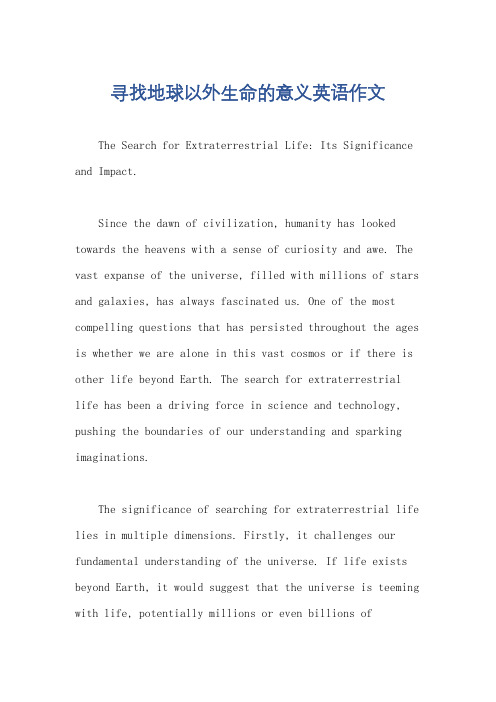
寻找地球以外生命的意义英语作文The Search for Extraterrestrial Life: Its Significance and Impact.Since the dawn of civilization, humanity has looked towards the heavens with a sense of curiosity and awe. The vast expanse of the universe, filled with millions of stars and galaxies, has always fascinated us. One of the most compelling questions that has persisted throughout the ages is whether we are alone in this vast cosmos or if there is other life beyond Earth. The search for extraterrestrial life has been a driving force in science and technology, pushing the boundaries of our understanding and sparking imaginations.The significance of searching for extraterrestrial life lies in multiple dimensions. Firstly, it challenges our fundamental understanding of the universe. If life exists beyond Earth, it would suggest that the universe is teeming with life, potentially millions or even billions ofcivilizations. This would revolutionize our understanding of the universe, making it less of a lonely and desolate place and more of a vibrant and diverse ecosystem.Secondly, the search for extraterrestrial life has the potential to answer fundamental questions about our own existence. Studying life beyond Earth could provideinsights into the origin and evolution of life, potentially giving us a better understanding of our own biological and cultural development. It could also provide clues about the potential for life to exist in other environments, such as on other planets or in extreme conditions here on Earth.Moreover, the search for extraterrestrial life is a powerful driving force for scientific innovation and technological advancement. It has spurred the development of new telescopes, probes, and spacecraft, enabling us to explore deeper into the universe than ever before. The technologies developed for this purpose have also found applications in other fields, such as medicine, communication, and even everyday life.The impact of the search for extraterrestrial life is also profound. It has fostered a sense of unity and cooperation among people from different cultures and backgrounds. The shared goal of finding life beyond Earth has transcended political and ideological divides, bringing people together in a common cause. This spirit of cooperation and exploration has the potential to bringabout positive changes in society, promoting understanding and respect among diverse groups.Additionally, the discovery of extraterrestrial life could have profound philosophical and religious implications. It could challenge our understanding of our place in the universe and our purpose as human beings. It could also lead to new discussions and debates about the nature of life, consciousness, and the meaning of existence.In conclusion, the search for extraterrestrial life is not just a scientific quest but a journey that has the potential to transform our understanding of the universeand ourselves. It challenges our fundamental beliefs and pushes the boundaries of our imagination. The discovery ofextraterrestrial life, whether it be microbial organisms or intelligent civilizations, would be a momentous occasion in human history, marking a new era of exploration and discovery. As we continue to search the heavens for signs of life, we also search for answers to the ultimate questions about our own existence and the vastness of the universe.。
有趣的讨论议题英文作文
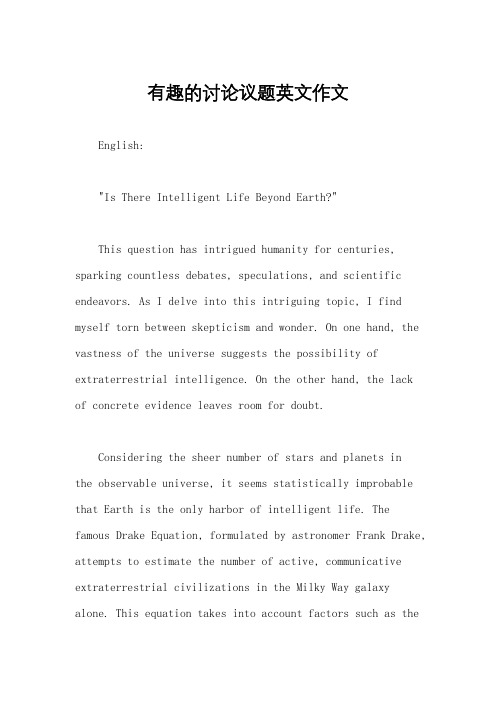
有趣的讨论议题英文作文English:"Is There Intelligent Life Beyond Earth?"This question has intrigued humanity for centuries, sparking countless debates, speculations, and scientific endeavors. As I delve into this intriguing topic, I find myself torn between skepticism and wonder. On one hand, the vastness of the universe suggests the possibility of extraterrestrial intelligence. On the other hand, the lackof concrete evidence leaves room for doubt.Considering the sheer number of stars and planets inthe observable universe, it seems statistically improbable that Earth is the only harbor of intelligent life. The famous Drake Equation, formulated by astronomer Frank Drake, attempts to estimate the number of active, communicative extraterrestrial civilizations in the Milky Way galaxy alone. This equation takes into account factors such as therate of star formation, the fraction of stars with planets, and the likelihood of life evolving on those planets. While the Drake Equation is highly speculative and subject towide interpretation, it underscores the plausibility of intelligent life existing elsewhere in the cosmos.Moreover, advancements in astrobiology have revealedthat life can thrive in extreme environments on Earth, from deep-sea hydrothermal vents to acidic hot springs. This expands the range of potential habitats for life beyond our planet, including moons of gas giants like Jupiter and Saturn, where subsurface oceans might harbor microbial life. The discovery of extremophiles on Earth has fueled optimism that similar organisms could survive in seemingly inhospitable environments elsewhere in the universe.Furthermore, the search for extraterrestrialintelligence (SETI) continues unabated, utilizing radio telescopes to scan the skies for artificial signals indicative of intelligent civilizations. While SETI has yet to yield a definitive detection, the sheer scale of the endeavor reflects humanity's enduring fascination with thepossibility of cosmic companions.However, despite these compelling arguments, the absence of concrete evidence remains a significant obstacle. The Fermi Paradox, named after physicist Enrico Fermi, succinctly captures this conundrum: if intelligent life is common in the universe, why haven't we detected any signals or observed any visitations? Various hypotheses have been proposed to address this paradox, ranging from the notion that intelligent civilizations self-destruct before theycan make contact to the idea that interstellar travel is prohibitively difficult.Ultimately, the quest to unravel the mystery of extraterrestrial intelligence transcends scientific inquiry; it speaks to our deepest existential questions about humanity's place in the cosmos. Whether we discover intelligent life beyond Earth or not, the pursuit broadens our perspective and fosters humility in the face of the unknown.中文:"地球之外是否存在智慧生命?"这个问题几个世纪以来一直让人类着迷,引发了无数的辩论、猜测和科学探索。
Life Beyond the Earth杭州文学翻译-译国译民翻译
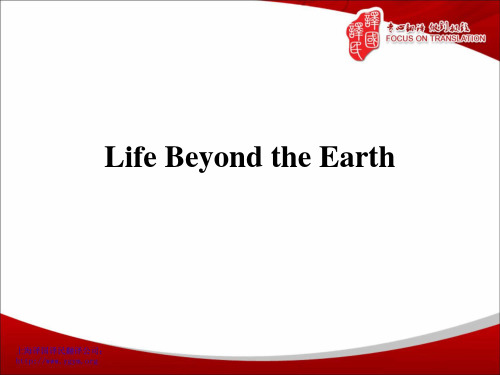
Structure of the Text
• Part I (Paras1-2) the emergence of life • Part II Para 3 (transition) what else is alive out there? • Part III (Paras4-10) search of life • Part IV ( Paras11-23) search for intelligence • Part V ( Paras 24-42) Mars and the debate • Part VI( Paras43-45) Allen’s argument • Part VII (Paras 46-51) conclusion •
• Para. 3 • 1. What else is alive out there? • Out there: in space beyond the earth. • Paraphrase: Is there anything similar to human life in other parts of the universe? •
Meanings of the Title
• Life beyond Earth contains two meanings: • A. there might be live organisms in the universe. • B. there might be intelligence or alien civilizations out in the universe, e.g. UFO. •
• Para. 4 • 1. There may be no scientific mystery so tantalizing at the brink of the new millennium and yet so resistant to an answer. • At the turn of the new millennium, one may not find anything which is scientifically unknown to human beings so intriguing and yet so difficult to answer as the issue of extraterrestrial life. • 2. Extraterrestrial life represents an enormous gap in our knowledge of nature. • Whether there is life beyond Earth means that, in nature, there are a great number of things we don’t know.
地球外有生命存在吗:一起来找证据!-中英互译
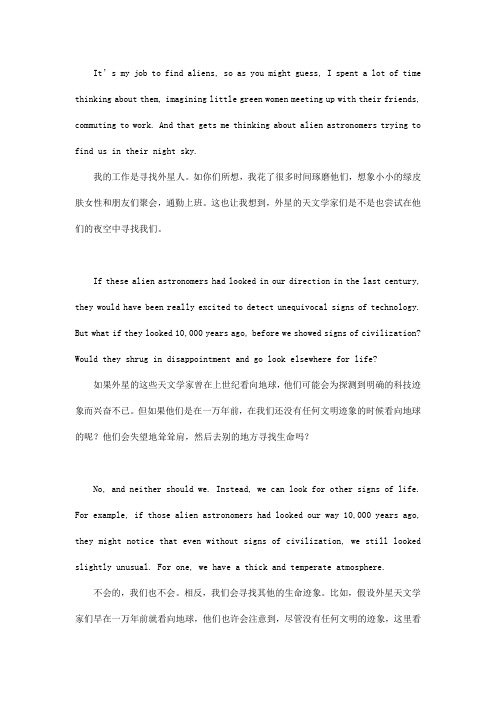
It’s my job to find aliens, so as you might guess, I spent a lot of time thinking about them, imagining little green women meeting up with their friends, commuting to work. And that gets me thinking about alien astronomers trying to find us in their night sky.我的工作是寻找外星人。
如你们所想,我花了很多时间琢磨他们,想象小小的绿皮肤女性和朋友们聚会,通勤上班。
这也让我想到,外星的天文学家们是不是也尝试在他们的夜空中寻找我们。
If these alien astronomers had looked in our direction in the last century, they would have been really excited to detect unequivocal signs of technology. But what if they looked 10,000 years ago, before we showed signs of civilization? Would they shrug in disappointment and go look elsewhere for life?如果外星的这些天文学家曾在上世纪看向地球,他们可能会为探测到明确的科技迹象而兴奋不已。
但如果他们是在一万年前,在我们还没有任何文明迹象的时候看向地球的呢?他们会失望地耸耸肩,然后去别的地方寻找生命吗?No, and neither should we. Instead, we can look for other signs of life. For example, if those alien astronomers had looked our way 10,000 years ago, they might notice that even without signs of civilization, we still looked slightly unusual. For one, we have a thick and temperate atmosphere.不会的,我们也不会。
2019年高考英语阅读理解一轮练(8)含解析

2019年高考英语阅读理解一轮练(8)李仕才AA recent survey in the United States showed that the average family spent more money on its pets than on its children. Although rather shocking, it should not surprise anyone who has seen the doggy parlours(客厅) where loved pets rest. Are Americans unique in treating their little friends in this way? No, the English, too, pay more attention to their pets.This can clearly be seen when we look at pet foods,which often contain more vitamins than human food. They certainly cost much. Last year the British public spent two hundred million pounds on pet food alone, to say nothing of veterinary bills or animal furniture. It is difficult not to feel angry about this when considering what the same amount could do for victims of starvation and poverty, so it’s not unusual for me to get hot under collar when I read an old man left all his money to his dog instead of his children.There are a variety of reasons why I find pets-raising alarming. They cause physical problems. An example of this is New York where they have great difficulty getting rid of the mess that dogs leave on the streets. Many people find this funny, but in a number of large cities it is a major problem. Animals can cause disease, too. It is the threat of babies — a disease with no known cure.Another problem is the carelessness of pet owners. Most little children want a dog or a cat,and they continually push their mothers and fathers until they get one. It is only when the "sweet little thing" has been brought home that the parents realize how much time and money must be spent on "Rover" or "Bonzo". Then they just abandon it. As a result, they are allowed to run free. English farmers lose hundreds of sheep a year, killed by someone’s pet and you must have read of children being hurt by some pets of their own.Lastly, I would only suggest that we have got our priorities wrong and that something should be done about it. In my view, it’s time we stopped being sentimental about pets. I can see no reason why we should get upset when animals are cut up formedical experiments. This will lead us to discovering cures for serious human diseases, then I say,"keep cutting!"1. The doggy parlours are mentioned in the 1st paragraph to show ________.A. what costly lives the pets are livingB. where Americans keep their petsC. why children love their pets so muchD. how much pets depend on their masters2. In the second paragraph "to get hot under the collar" probably means ________.A. getting quite hotB. becoming excitedC. feeling extremely angryD. receiving a fashionable shirt3. According to the author, in which field can animals be most useful?A. Food.B. Sports.C. Entertainment.D. Medicine.4. What is the author’s attitude towards pets-raising?A. Sympathetic.B. Opposed.C. Pitiful.D. Supportive.【文章大意】这是一篇议论文。
全新版大学进阶英语综合教程2综合训练第四单元(含答案)

全新版大学进阶英语综合教程2综合训练第四单元练习题(含答案)Part I Listening ComprehensionSection ADirections: In this section, you will hear two news reports. At the end of each news report, you will hear two questions. Both the news report and the questions will be spoken only once. After you hear a question, you must choose the best answer from the four choices marked A), B), C) and D).Questions 1 and 2 will be based on the following news item.1.A) Children first words.B) Eager parents.C) Music for parents.D) Toddler speech development.2.A) Because her two-year-old son spoke many words.B) Because she was concerned about her son.C) Because she wondered if her son had speech delay.D) Because she could not understand her son.Questions 3 and 4 will be based on the following news item.3.A) China sells about seventy percent of the world ivory.B) China will forbid ivory trade by the end of 2017.C) China has built the largest market in the world.D) China is the largest market for valuable commodities.4.A) Because it will help preserve endangered elephants.B) Because it can save over 20,000 elephants a year.C) Because the elephant population in Asia has declined.D) Because there are only half a million elephants in Africa.Section BDirections: In this section, you will hear two long conversations. At the end of each conversation, you will hear four questions. Both the conversation and the questions will be spoken only once. After you hear a question, you must choose the best answer from the four choices marked A), B), C) and D).Conversation OneQuestions 5 to 8 are based on the conversation you have just heard.5.A) Sally diamond ring. B) Sally Valentine Day present.C) Sally boyfriend Robert.D) Sally wedding plan.6.A) He proposed to Sally.B) He got on his knees.C) He talked about marriage.D) He got married.7.A) To offer some help. C) To be her Maid of Honor.B) To prepare for her wedding.D) To find three bridesmaids.8.A) Tina.C) Cindy.B) Susan.D) Lydia.Conversation TwoQuestions 9 to 12 are based on the conversation you have just heard.9.A) Whether zoos are good for animals or not.B) Whether they should go to the zoo this Saturday.C) Whether wild animals should be rescued or not.D) Whether a polar bear should live in California.10.A) Because they cannot survive on their own in the wild.B) Because zoos often rescue some wild animals.C) Because the animals have to stay in cages there.D) Because zoos often take good care of the animals.11.A) People can see a polar bear in California.B) People can enjoy learning about the animals.C) People are able to see real animals there instead of on TV.D) People can experience different climates in zoos.12.A) Cages should be removed from the zoos.B) Wild animals should not be rescued.C) Animals should live their own way.D) Zoos should not prolong animals?life.Section CDirections: In this section, you will hear two passages. At the end of each passage, you will hear some questions. Both the passage and the questions will be spoken only once. After you hear a question, you must choose the best answer from the four choices marked A), B), C) and D). Passage OneQuestions 13 to 15 are based on the passage you have just heard.13.A) Why airplane windows used to be rectangular.B) Why windows in the home are rectangular.C) Why the windows on airplanes are round.D) Why windows can cause airplanes to crash.14.A) When two commercial airplanes crashed within months.B) When the speed of commercial airplanes greatly increased.C) When investigators found the weakness of rectangular windows.D) When commercial airlines began to develop faster.15.A) They have become the new standard in passenger aviation.B) They have three layers of window panes at work.C) They collect 70 percent of the stress of air pressure.D) They are able to scatter pressure more evenly.Passage TwoQuestions 16 to 18 are based on the passage you have just heard.16.A) It is an ambitious research program.B) It is a comprehensive resolution.C) It includes a series of new technologies.D) It has become a global focus.17.A) Environmental protection.C) Emissions reduction.B) Less noisy aircrafts.D) Finding alternative fuels.18.A) A highly internationalized industry.B) A new international trend.C) A competitive advantage.D) A low-carbon economy.Part II Reading ComprehensionSection ADirections: In this section, there is a passage with ten blanks. You are required to select one word for each blank from a list of choices given in a word bank following the passage. You may not use any of the words in the bank more than once.How long have 1) _____ industrialists been dreaming about flying cars? So long that they are not called flying cars anymore. Now they oadable aircraft? And while the 2) _____ for success of such roadable aircrafts are still in doubt, that doesn’t mean the 3) _____ of the flying vehicle is dead. We might just need to come at the problem from a different direction.One such new 4) _____ is the AL-V (personal air land vehicle[车辆]) formed in Europe that changes from a road-going three-wheel motorcycle into a gyrocopter(旋翼机) that appears to fly as well as it drives ?which is to say very well in both regards. Where the flying cars have suffered from a lack of lateral stability(横向稳定性) in flight and mechanical 5) _____ on the ground, the PAL-V flies as well as any gyrocopter you are likely to see and, thanks 6) _____ its wonderful suspension(悬浮) system, drives like one of the best three-wheel motorcycles in the streets.The Dutch company behind the project has completed first testing of the PAL-V One prototype(样品) and 7) _____ that it could travel through the air over a distance of up to 275 nautical miles(海里) at a 8) _____ of 95 knots(节). The company recently announced it will begin production of the PAL-V with a limited 9) _____ of 45 vehicles priced at around $400,000 apiece.So while the flying car might not have a place in immediate 10) _____, perhaps a flying, three-wheeled gyrocopter will.A) vehicle B) approach C) confirmed D) aviationE) future F) attach G) chances H) transportationI) concept J) feature K) to L) complexityM) number N) speed O) flightSection BDirections: In this section, you are going to read a passage with ten statements attached to it. Each statement contains information given in one of the paragraphs. Identify the paragraph from which the information is derived. You may choose a paragraph more than once.NASA Next Giant LeapA)It was 45 years ago that Neil Armstrong took the small step onto the surface of the moon that changed the course of history. The years that followed saw a Space Age of scientific, technological and human research, on which we have built the modern era. Starting from the moon, we will move deeper into the solar system. The Apollo missions cleared a path for human exploration to the moon. Today we are extending that path to near-Earth asteroids(小行星), Mars and beyond.B)We are building on the Apollo program accomplishments to test and fly novel(新的), cutting-edge(尖端) technologies today for tomorrow missions. As we develop and test the newtools of 21st century spaceflight on the ourneyo Mars, we once again will change the course of history.C)The path to Mars begins with research on Earth and extends beyond its bounds, aboard the orbiting laboratory of the International Space Station, with our international partners. Some 250 miles above our heads, astronauts are conducting hundreds of experiments not possible on Earth, teaching us how humans can live, work and thrive(长得健壮) for longer periods in space.D)To help this nation send humans to deep space and return them to Earth safely, engineers across the country are developing a new space transportation tool that can travel far beyond our home planet. The Orion spacecraft and Space Launch System (SLS) heavy-lift rocket will be the most advanced space vehicles ever built. Together, they will take us farther into the solar system than humans have ever traveled. They are our spaceship to Mars and beyond.E)As we turn our eyes toward Mars, we are designing missions to take us to a roving ground?around the moon called cis-lunar(月球周围) space, where some of the very building blocks of the solar system can be explored.F)Near-Earth asteroids provide a unique opportunity we need for future human missions to Mars. Around 2019, we launch a robotic mission to reach a near-Earth asteroid. The spacecraft either will capture an entire asteroid or take a part off a much larger asteroid, then redirect the asteroid mass to a stable orbit(轨道) around the moon. Such missions will provide important information about the space to safely send humans to Mars.G)The new technologies we test by sending astronauts to study the asteroids in the cis-lunar space will make important advances to safely send humans to Mars. This includes tools like Solar Electric Propulsion, a highly efficient way to help us transport large objects and heavy cargo to support future Mars missions. NASA will continue to make significant investments in new technologies vital to achieving exploration goals. This includes advancements in entry, descent and landing technologies such as ow Density Supersonic Decelerators.H)Sending humans to deep space around the moon also will help advance techniques for space operations on and around Mars and its moons. The space around our moon is different than low-Earth orbit but very similar to what a spacecraft will experience on the trip to and from Mars. For instance, solar and cosmic radiation is intense. We also can use cis-lunar space to begin practicing activities in deep space, like spacewalks, and learn to cope with delays in communication with Earth because of the distance.I)Mars calls for us to explore. Missions to Mars could answer some of the fundamental questions of humanity: Does life exist beyond Earth? Could humans live on Mars in the future? J)The journey to answer these questions has risks, but the rewards for humanity are worth it. In our lifetime, NASA and the world will take the next giant leap to explore the red planet.______11.Preparation for the journey to Mars can start from a place near Earth.______12.People from different countries contribute to the exploration of Mars in one way or another.______13.Great benefits will be gained from missions to Mars.______14. A number of new technologies will be needed to send human beings to Mars.______15Despite the risks, it is worthwhile to take this great leap to explore Mars.______16.We are now standing on a new horizon, ready to take the next giant leap.______17.If we want to travel to Mars, a more powerful form of transportation is needed.______18.The cis-lunar space will serve as a genuine training ground.______19.New missions near Earth will provide new information before we really send a human being onto Mars.______20.The Apollo program has provided a strong base for our future explorations.Section CDirections: There are two passages in this section. Each passage is followed by some questions or unfinished statements. For each of them there are four choices marked A), B), C) and D). You should decide on the best choice.Passage OneBelieve it or not, there is a whole generation of young people who would love to own a personal airplane but who have little or no interest in learning to fly. To satisfy demand from this new kind of traveler, futurists dream of building airplanes that will fly themselves with minimal input from their occupants(用户). Rather than planning a flight, checking weather and attending to all the other duties of pilot-in-command, the operators of these future aircrafts will simply hop in the front seat, press a few buttons (or merely speak to the flight computer) to input the desired destination and then kick back while the virtual(虚拟的) pilot does all the flying.It hard to imagine what level of understanding of aerodynamics(空气动力学) or aviation rules and regulations the operator of such a futuristic airplane would be required to possess, but for this concept to work the answer quite probably would have to be very little to none. After all, a 損ilot?who is so far removed from the decision-making processes and the actual hands-on flying of the airplane shouldn抰be depended on to take over in an emergency. Instead, these future general aviation airplanes will be little more than passenger-carrying UAVs (unmanned aerial vehicle[无人驾驶航空器]).In such cases, trained pilots on the ground could be given access to the airplane controls through a secure datalink(数据链) connection, enabling the remote operator to take over ?for a fee, of course. It similar to a concept now being debated in the airline world, where future Boeing and Airbus jetliners would have only one pilot physically on board the airplane with ground-based copilots available to step in as needed.We may not like the idea, but as we are seen in the UAV world, such operations are already possible. As the technology evolves and matures to enable airplanes to fly and land automatically without any help from humans, there no reason why airplane manufacturers (制造商) 20 years from now might not start offering a cockpit as optional equipment.21.What do futurists dream of?A) Owning a personal airplane. B) Attending to the duties of a pilot.C) Making planes with automatic piloting. D) Flying an airplane by themselves.22.What is the main characteristic of the new kind of traveler?A) They have considerable interest in learning to fly.B) They like owning and flying a personal airplane.C) They like to speak to the flight computer.D) They want to fly an airplane with minimal efforts.23.Which of the following is true of the virtual pilot on such futuristic airplanes?A) It is not as good as a human pilot. B) It knows everything about aerodynamics.C) It can easily replace a human pilot.D) It can take over in times of emergency.24.It is still necessary for human pilots on the ground to control such a plane because ______.A) such a plane is no more than an unmanned aerial vehicleB) the virtual pilot cannot handle an emergencyC) human pilots can make more money for thisD) there is a datalink connection to the controls25.Which of the following can serve as a proper title for the passage?A) The New Kind of Traveler C) The Virtual PilotB) The Fully Automated Airplane D) The Removed Human PilotPassage TwoNASA is now trying to make a spaceship that is much better than other ships.If we look at the things we need for our super spaceship, there seems to be one that is the most important. The spacecraft has to be as light as it can be. Weight costs money!A new discovery might allow spacecraft to be lighter. Imagine something that is stronger than steel but also weighs less. A new material called arbon nanotube?碳纳米管) might be the answer to the weight problem of building a super spaceship. This material is 600 times stronger than steel.One of the big problems with space travel is the radiation that in space. On Earth, our atmosphere protects us from radiation. In space, however, astronauts need protection against harmful rays.You might think that the metal on a spaceship is the answer. But, metals are the worst for shielding against very dangerous space rays. These rays are made of little pieces called ions(离子). When the ions hit metals at very high speeds, they can break an atom and cause another type of ray to form. These new rays can be worse than the radiation the metal skins were supposed to stop.You see why it is so important to block out these rays.But, we could use carbon nanotubes to make the skins of spacecraft. Nanotubes look a little like chicken wire that is too small to see.Things that are light in weight seem to work the best against these ions. When the rays hit lighter things, very little new radiation is made. The rays are stopped outside the spacecraft and new rays aren’t made.In addition, our super spaceship needs to be able to repair itself. This might really be possible. Humans can feel the smallest pinpricks(针刺) because of tiny sensors that send signals to our brains. Tiny sensors like ours could be built in the new ships. Each sensor could send messages to the computer rain?of the spacecraft. If something needed to be fixed, the computer could tell the ship to do it.Just as amazing as a car would be to someone 200 years ago, our nanotube spaceship might seem to us. We might actually make the spacecraft of tomorrow, using the technology of today.26.What is NASA trying to do?A) To make carbon nanotubes. B) To protect astronauts from ions.C) To make a new discovery.D) To build a super spaceship.27.Carbon nanotubes could be used to make the skins of spacecraft because ______.A) they are much lighter than metalB) they are 600 times stronger than steelC) they can shield the spacecraft from radiationD) they can break ions in space rays28.What will happen when ions hit the metal on a spaceship?A) Some worse radiation will be produced.B) All radiation will be blocked out.C) The metal on the spaceship will break up.D) The ions will move at high speeds.29.Tiny sensors will be built into the new spaceship so that ______.A) the computer brain can feel the smallest pinpricksB) the spaceship can have human sensationsC) the sensors can send signals to the spaceshipD) the spaceship will be capable of repairing itself30.What is the passage mainly about?A) How to build a future spaceship.B) How to make use of carbon nanotubes.C) How to protect astronauts in space.D) How to block out radiation.Part III TranslationDirections: Translate the passage from Chinese into English.周六,在戈壁滩发射基地——甘肃省酒泉卫星发射中心,神舟九号飞船载着中国第一位女宇航员升空。
高级英语 整体教学大纲

《高级英语》教学大纲1 课程的基本描述课程名称:高级英语Advanced English课程编号:2111C19B 课程性质必修课课程类别:学科基础课适用专业:英语教材选用:梅仁毅. 现代大学英语精读5、6册. 北京:外语教学与研究出版社, 2012.总学时:128学时理论学时:128学时实验学时:0 课程设计:无学分:4学分开课学期:第五、六学期前导课程:体验商务英语系列教程后续课程:2 教学定位2.1 能力培养目标本课程主要培养学生的阅读理解能力,接近实战要求,具体包括:1. 通过教学,使学生懂得入门不等于已经成为合格英语专门人才,要帮助学生看到基础阶段所学之不足,激发他们攀登英语高峰的雄心。
2. 加强学生的阅读理解能力。
首先要理解内容,这阶段的教材题材更广,内容有相当的难度,这就要求学生认真领会、深入钻研、积极思维并学习进行有水平的分析评论。
其次语言背景方面也会有更大的挑战。
需要提高学生同义词辨义和英语释义的能力。
3. 增强学生的分析欣赏能力。
帮助学生理解幽默、讽刺、含蓄、夸张、比喻、象征等各种修辞手段;熟悉各种写作技巧及方法。
4. 帮助学生学会使用各种高级工具书以及其他手段收集资料,解决难题。
2.2 课程的主要特点《高级英语》课程的教学对象为大学本科英语专业三年级学生,本课程要求学生通过阅读扩大词汇量,正确理解文章的内容和主题思想,抓住文章的要点,分析文章的结构、语言技巧和修辞特点;提高学生语言表达能力,提高学生的逻辑思维和判断评述能力。
通过一学年(128学时)的高级英语课程的学习,学生应达到高等学校外语专业教学指导委员会修订的《高等学校英语专业英语教学大纲》所规定的要求:认知词汇达10000以上,能正确和熟练地使用其中5000多个最常用的单词;能熟练掌握句子之间和段落之间的各种衔接手段,连贯地表达思想;能读懂一般英美报刊杂志上的文章、英语国家出版的有一定难度的历史传记和文学作品,能分析文章的思想观点、语篇结构、语言特点和修辞手法等。
太空探险的意义利与弊英语作文
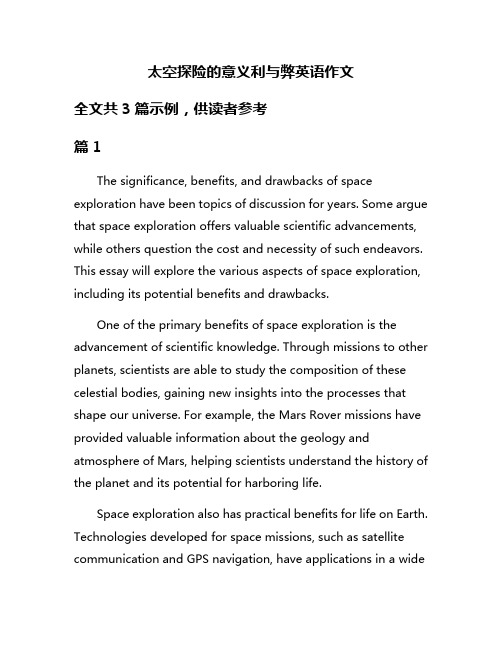
太空探险的意义利与弊英语作文全文共3篇示例,供读者参考篇1The significance, benefits, and drawbacks of space exploration have been topics of discussion for years. Some argue that space exploration offers valuable scientific advancements, while others question the cost and necessity of such endeavors. This essay will explore the various aspects of space exploration, including its potential benefits and drawbacks.One of the primary benefits of space exploration is the advancement of scientific knowledge. Through missions to other planets, scientists are able to study the composition of these celestial bodies, gaining new insights into the processes that shape our universe. For example, the Mars Rover missions have provided valuable information about the geology and atmosphere of Mars, helping scientists understand the history of the planet and its potential for harboring life.Space exploration also has practical benefits for life on Earth. Technologies developed for space missions, such as satellite communication and GPS navigation, have applications in a widerange of industries, from telecommunications to agriculture. Additionally, the study of space can help us better understand and prepare for potential threats, such as asteroid impacts or solar flares, that could have catastrophic consequences for our planet.Furthermore, space exploration can inspire and educate future generations. The achievements of space agencies like NASA and SpaceX capture the imagination of people around the world, encouraging young minds to pursue careers in science, technology, engineering, and mathematics. Educational programs and outreach initiatives help to foster an interest in space exploration and inspire the next generation of scientists and engineers.Despite these benefits, space exploration also has its drawbacks. One of the most significant concerns is the cost of space missions, which can run into billions of dollars. Critics argue that this money could be better spent on addressing pressing issues on Earth, such as poverty, climate change, and healthcare. Additionally, the risks associated with space travel, such as radiation exposure and isolation, raise ethical questions about the safety and well-being of astronauts.Another drawback of space exploration is the environmental impact of space debris. The debris left behind by satellites and spacecraft poses a risk to other orbiting objects, such as the International Space Station, and can contribute to the growing problem of space pollution. Efforts to mitigate this issue, such as the development of cleaner propulsion technologies and the removal of debris from orbit, are ongoing but require investment and collaboration from space agencies and commercial operators.In conclusion, the significance of space exploration lies in its potential to expand our scientific knowledge, advance technologies, and inspire future generations. While there are drawbacks to consider, such as the cost and environmental impact of space missions, the benefits of exploring the cosmos outweigh these concerns. By continuing to support and invest in space exploration, we can unlock the mysteries of the universe and pave the way for a brighter future for humanity.篇2The Significance, Pros, and Cons of Space ExplorationIntroductionSpace exploration has captured the imagination of humanity for decades. From the first human landing on the moon to the exploration of Mars and beyond, space exploration has brought forth immense technological advancements and scientific discoveries. However, the pursuit of space exploration also comes with its own set of challenges and controversies. In this essay, we will explore the significance, pros, and cons of space exploration.Significance of Space ExplorationSpace exploration has had a profound impact on human society. It has sparked innovation in various fields, such as engineering, technology, and materials science. For example, the development of lightweight materials used in spacecraft has led to advancements in industries such as aviation and automotive. Space exploration has also resulted in the creation of new technologies, such as satellite communications, GPS, and weather forecasting systems, which have revolutionized our daily lives.Furthermore, space exploration plays a crucial role in expanding our understanding of the universe. By exploring other planets, moons, and celestial bodies, scientists are able to study the origins of the solar system and the possibility of life beyondEarth. The exploration of Mars, for instance, has provided valuable insights into the planet's geological history and potential habitability.Pros of Space Exploration1. Technological Advancements: Space exploration drives innovation in technology, leading to the development of new materials, propulsion systems, and communication technologies that benefit society as a whole.2. Scientific Discoveries: Space exploration expands our knowledge of the universe and provides insights into the origins of life and the potential for extraterrestrial life.3. Economic Benefits: Space exploration stimulates economic growth by creating jobs, fostering collaboration between industries, and generating revenue through the commercialization of space technologies.4. Inspiration and Education: Space exploration inspires the next generation of scientists, engineers, and explorers, encouraging them to pursue careers in STEM fields and contribute to the advancement of human knowledge.Cons of Space Exploration1. Cost: Space exploration is a costly endeavor that requires significant financial investment from governments and private organizations. Critics argue that these resources could be better spent addressing pressing issues on Earth, such as poverty, healthcare, and climate change.2. Environmental Impact: The launch and operation of spacecraft can have negative environmental effects, such as the release of pollutants into the atmosphere and the generation of space debris that poses a threat to satellites and space missions.3. Ethical Concerns: Some people raise ethical concerns about the potential exploitation of outer space resources, the impact of space colonization on indigenous life forms, and the militarization of space.ConclusionSpace exploration has both pros and cons, and it is essential to weigh the benefits against the challenges. While space exploration has provided numerous technological advancements, scientific discoveries, and economic benefits, it also comes with its own set of costs and ethical considerations. As we continue to explore the cosmos, it is crucial to address these challenges responsibly and ensure that the benefits of space exploration outweigh the potential drawbacks. Ultimately, space explorationhas the potential to unite humanity in the pursuit of knowledge and inspire us to reach for the stars.篇3The Significance, Benefits, and Drawbacks of Space ExplorationIntroductionSpace exploration has fascinated mankind for centuries, with humans dreaming about venturing beyond our planet and reaching the stars. In recent history, technological advancements have made space exploration a reality, allowing astronauts to travel to the moon, Mars, and beyond. However, the quest for exploring space comes with both benefits and drawbacks, which need to be carefully considered.Significance of Space ExplorationThe exploration of space holds immense significance for humanity as a whole. Firstly, it allows us to expand our knowledge of the universe and uncover its mysteries. By studying other planets, stars, and galaxies, scientists can gain insight into fundamental questions about the origins of the universe, the existence of extraterrestrial life, and the possibilities for human colonization of other worlds.Secondly, space exploration has led to numerous technological advancements that benefit society on Earth. For example, advancements in communication satellites, weather forecasting, and medical imaging have all been made possible by space exploration. These technologies have improved our quality of life and contributed to economic growth and prosperity.Furthermore, space exploration has the potential to inspire future generations of scientists, engineers, and explorers. Seeing astronauts travel to other worlds and conduct groundbreaking research can ignite a passion for space exploration in young people and inspire them to pursue careers in STEM fields.Benefits of Space ExplorationThere are numerous benefits that come from space exploration, both for humanity as a whole and for individuals. One of the most significant benefits is the potential for expanding our understanding of the universe and our place within it. By studying other planets, stars, and galaxies, scientists can gain insight into the origins of the universe, the existence of extraterrestrial life, and the possibilities for human colonization of other worlds.Additionally, space exploration has led to the development of numerous technologies that benefit society on Earth. Forexample, advancements in communication satellites, weather forecasting, and medical imaging have all been made possible by space exploration. These technologies have improved our quality of life and contributed to economic growth and prosperity.Furthermore, space exploration has the potential to inspire future generations of scientists, engineers, and explorers. Seeing astronauts travel to other worlds and conduct groundbreaking research can ignite a passion for space exploration in young people and inspire them to pursue careers in STEM fields.Drawbacks of Space ExplorationDespite the many benefits of space exploration, there are also drawbacks that must be considered. One of the main drawbacks is the high cost associated with space missions. Building rockets, spacecraft, and supporting infrastructure is expensive, and the cost of sending astronauts into space is often prohibitive.Another drawback is the potential for accidents and mishaps during space missions. Space exploration is inherently risky, and astronauts face a variety of hazards, including radiation exposure, mechanical failures, and human error. The loss of life and equipment during space missions can be devastating and raise questions about the value of sending humans into space.Furthermore, some critics argue that the resources and funds spent on space exploration could be better used to address pressing issues on Earth, such as poverty, disease, and climate change. They argue that the money spent on space missions could be better allocated to improving the lives of people on Earth and addressing the urgent challenges facing our planet.ConclusionIn conclusion, space exploration holds immense significance for humanity, offering the potential to expand our knowledge of the universe, develop new technologies, and inspire future generations of scientists and explorers. However, space exploration also comes with drawbacks, including high costs, risks to human life, and competition for resources. As we continue to explore and expand our presence in space, it is essential to carefully consider the benefits and drawbacks and weigh the value of space exploration against other pressing issues facing our world. Ultimately, the quest for space exploration is a reflection of humanity's curiosity, ambition, and desire to push the boundaries of what is possible.。
- 1、下载文档前请自行甄别文档内容的完整性,平台不提供额外的编辑、内容补充、找答案等附加服务。
- 2、"仅部分预览"的文档,不可在线预览部分如存在完整性等问题,可反馈申请退款(可完整预览的文档不适用该条件!)。
- 3、如文档侵犯您的权益,请联系客服反馈,我们会尽快为您处理(人工客服工作时间:9:00-18:30)。
[P30]tarnish:
[P31]dissenter: 反对者 [P33]contaminant: 污染物
Life beyond earth
Words and Expressions:
Life beyond earth
[P1]Qualitatively: 从性质上讲
[P2]Notoriously: 非常 [P2]Replicate: 复制
[P4]Tantalizing: arousing desire or expectation for sth. unattainable or mockingly out of reach, intriguing but elusive.
plausible
• Such talk, however plausible, is actually specious and groundless. 这些话,讲起来好像有道理,实际上是毫 无根据、似是而非的空谈。 • He cast about in his mind for some plausible excuse for not turning up at the meeting. 他心里在算盘,想找一个什么说得过去的 理由来解释他为什么没有到会。
[P7]ideology: ideas that form the basis of an economic or political theory or that are held by a particular group or person 思想(体系); 思想意识
[P7] random ought-to-bes: possible things which are chosen without specific aim. [P7]carbon atom: 碳原子 [P7] burrow: make (sth.) by digging 挖掘成(洞穴等) [P8]envelop: wrap sth./sb. up; cover or surround sth./sb. completely (in sth.) 包 住某事物[某人]; 将某事物[某人]覆盖, 包围(於某事物中):
Life beyond earth
[P11] yield:
[P12]boosterism: 积极支持,热心拥护 [P13]residue: what remains after a part or quantity is taken or used剩余物; 残余 [P14]epochal: 新纪元的; 有重大意义的; 划时代的 [P14]settle for: to accept or allow sth., esp. sth. not entirely desirable.满足于 e.g.. He’ll settle for any kind of work. [P15]abiding: 持续的, 持久的; 不变的 [P15] hydrogen, nitrogen: H,N. 氢,氮
Life beyond earth
[P21]posit: suggest or assume (sth.) as a fact; postulate 断定或假定(某事物) 为实; 假设 [P21] interstellar travel: between the stars 星与星间的; 星际的. 星际旅行 [P23]stock character: 平凡角色 [P23]cosmos: 宇宙 [P24] Martian: 火星人,火星的 [P25]tweak: pinch and twist (sth.) sharply 拧, 扭(某物) [P26]artifact: 人工制品;手工艺品;加工品 [P26]eradicate: destroy (sth.) completely; put an end to (sth.) 根除, 消灭(某事 物); 结束(某事物) [P26]reminiscent of: 使人回想或联想起某人[某事物] [P27]molecule: 分子 [P27]funk: (state of) fear or anxiety 恐惧; 忧虑
[P9]pore: any of the tiny openings in the surface of the skin or of a leaf, through which moisture can pass (皮肤上的)毛孔; (叶子上的)气孔
[P9]scalding: 滚烫的
infuse
Life beyond earth
[P29]meteorite: piece of rock or metal that has reached the earth's surface from outer space 陨星; 陨石; 陨铁.
[P30]purport:
[P30]reciprocal: adj. given and received in return; mutual 互相给与的; 互惠的; 相互 的
• Vt.灌输,加入(一种特性)
~ new blood 注入新鲜血液 ~ new life into sb./sth.赋予人、物以新的生命
• Vt.&vi. 沏(茶),泡(草药)
~ tea/herbs ~ sb. with courage 鼓起某人的勇气
Life beyond earth
[P10] invasion: 在文中指investigation [P10] rover: a machine that goes from place to place over an extensive sea. [P10]canister: small (usu. metal) container for holding tea, coffee, etc.(通常为 金属的)小罐(装茶叶﹑ 咖啡等) [P10]parachute: (cause sb./sth. to) drop by parachute from an aircraft(使某人) 跳伞; 用降落伞空投(某物) [P10]scrutiny: (instance of) careful and thorough examination 仔细而彻底的检 查
yield
• 生出,出产;产生:the apple tree yields plenty of apples.
• ~capacity 生产能力
• 交出,投降:not yield a step. They yield the fortress to the enemy.
Life beyond eaface: 表面下的,地下的 [P10]conceivably: 想得到地; 可理解地, 可相信地
[P10]harbor:
[P10] biosphere: 生物圈
harbor
• 隐匿;窝藏;包庇:harboring criminals is an offense in law. • 心怀,怀有:to harbor evil thoughts. He harbors a wish to be a world championship.
[P15]inextribly: 逃不掉地; 解不开地; 解决不了地 [P16]photosynthesis: process by which green plants convert carbon dioxide and water into food using the energy in sunlight 光合作用 [P16]basaltic rock: 玄武岩岩石
Life beyond earth
[P6]microbe: tiny organism that can only be seen under a microscope, esp. one that causes disease or fermentation 微生物; (尤指)病菌, 酵母菌
[P6]starship: 飞船 [P7]plausiblity arguments: reasons which appear to be convincing but which may not be true. 似乎可能的~,好像有道理的~ [P7]hunch: idea based on intuition or instinct and not on evidence 基於直觉的 想法
[P18]flying-saucer alien: 乘飞碟来的外星人
[P18]jumpy: 跳跃的, 神经质的, 跳动的 [P18]abduct: take (sb.) away illegally, using force or deception; kidnap 诱拐; 绑架 [P20]secular: worldly 现世的; 世俗的 [P20]extrapolation: 推断 [P20]concede: admit that sth is true, valid, proper, etc 承认某事属实﹑ 有效﹑ 合理等
hunch
• I have a hunch that something is going to happen. 不知道为什么,我总感觉要出什么事似的 • Such an uncertainty may prevent you from acting on your hunch. 这个不明确因素可能阻挠你凭直觉行动。
[P4]Millennium: 千周年, 一个一千年; 千年纪念, 千周年纪念 [P4]Extraterrestrial: adj. of or from outside the earth and its atmosphere.地球 和大气层外的; 来自天外的 [P4]Hubble Space Telescope: 哈勃太空望远镜 [P5]Scenario: imagined sequence of future events(对可能出现情况的)描述、 推测 [P5]Galaxy: any of the large systems of stars in outer space 星系 [P5]Sk(c)eptic: 怀疑者 [P5]UCLA: University of California, Los Angeles.加州大学洛杉矶分校
